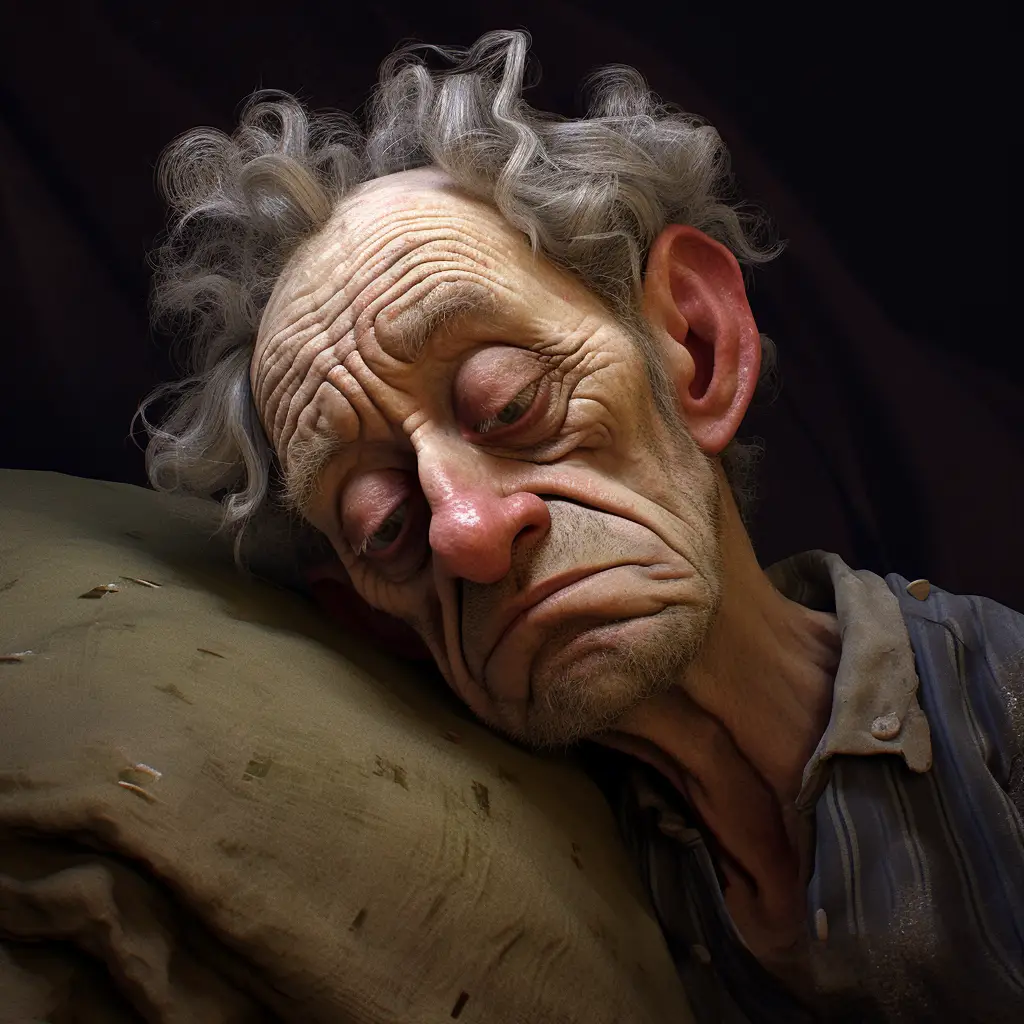
I still remember faking sick when I was a kid. I’d rub my forehead until it was red, wait a few minutes, walk into my parent’s room and raspily say “I don’t feel so good.”
Queue the sad puppy face.
Of course, I was never actually sick when I did this once or twice (okay maybe 50 times). I just really wanted to go back to sleep.
I love sleeping. And yet I’m terrible at it.
To top it off, I’m a lifelong unwilling subscriber to having dark circles under my eyes. They aren’t always extremely noticeable, but if I’m hungover, slept very little, or experienced some allergies that day — they become as black as night.
And at 36 years old, looking back at old photographs shows 50 shades of grey under my eyes way before that terrible movie came out. Lawsuit pending.
It’s probably because of this I’ve always been fascinated with the idea of sleep, how it affects us, and more importantly — how can we get better at it.
Sleep is natural — we all do it. But we don’t all do it well.
If you fall into that boat, there might be a few unusual things negatively affecting your precious beauty sleep.
5 Things Ruining Your Sleep
Let’s run through 5 proven ways that might be killing your sleep but are fortunately easily fixable!
1. You intermittent fast every day
I went full-on intermittent fasting this year for about 10 months. I had been toying with fasting and different diets for the last couple of years beforehand. I found intermittent fasting (IF for short) to fit my style of eating as I’ve never been much of a breakfast eater.
But one side effect of working for myself is I never have an angry boss waiting for me if I were to be late for work. As in, no consequences if I want to sleep in an extra hour or two some days.
Or every day…
By the end of the 10 months, I was sleeping regularly until about 2–3 pm — a habit I was almost ashamed of.
I was constantly trying to figure out what was keeping me from falling asleep earlier — a lack of a work schedule, occasional partying, too much caffeine? I looked at everything.
It wasn’t until I remembered reading a very interesting way to combat jet lag (a frequent problem for us ex-pats) that I realized it may have something to do with my diet.
Studies have shown that fasting up to 16 hours before the ‘normal’ wake up time at your destination can help reduce jet lag effects significantly.
I was consistently eating in a ‘4-hour feeding window’ (as the six-pack ‘gurus’ call it). I found it easy to do, filling, and didn’t have to watch what I ate too much.
The only problem — I was doing this at night time. I’d typically eat my breaklunchner around 8 pm and have a couple of meals between then and midnight.
I was messing up my sleep schedule and circadian rhythms by trying to eat in a healthier way — talk about biting yourself in the ass.
Quick Fix:
Most intermittent fasting programs talk about a 16:8 or a 20:4 hour split for non-eating to eating times. But I ignored the part where they often recommended those hours be from noon to 8 pm.
If you’re going to try intermittent fasting (which I loved), make sure you keep your eating window much earlier in the day than I did!
2. You’re exercising too much
Sometimes I find myself getting a bit too much into a new sport or hobby. About 12 years ago I set out to train for a triathlon because, well, why not?
I signed up for the local swimming pool, got a cheap road bike, and threw on a decent pair of jogging shoes.
Less than a month later I was going on nightly 12-mile jogs, swimming 6 days a week, and biking to and from work almost daily (to another town and back).
I was riding that beautiful high of endorphins and loving every minute of it. But I failed to notice that my sleep had gone to absolute crap as a result of it.
I was overtraining my body and never let myself have a proper break to recuperate.
If this sounds like something you’re in the middle of, start watching your sleep more carefully. Overtraining is thought to lead to a depressed immune system — which over time can equal a much poorer quality of sleep.
Quick Fix:
Try doing maintenance periods to break up the progressive training schedule. An occasional week with a reduced routine can be a great way for your body to catch up and adapt to an intense workout schedule.
3. You sleep in the absolute dark
Have you ever had a ‘cave day’? Just bundled up nice and warm in your bedroom, with your TV, favorite book, and a puppy named ‘Lay-Z’?
I call these ‘Sundays’ where I come from. And they’re fantastic. And not so full-of-sun.
But they might not be so good for your sleep. Staying indoors all day without spending a little bit of time having some sunlight glaze over your skin can mess with your circadian rhythms.
If you have more than one lack-of-Sun-days a week, this effect can start being more pronounced.
Quick Fix:
Spend at least 2 hours a day in sunlight — whether it’s in a room with giant windows or outside walking around. Daily exposure to bright light has been shown to increase the duration of sleep (and even help with depression!)
So go be more like Icarus — just not too much.
4. You vape too much
I’ve been smoking since my late teens. It’s probably the worst habit I ever picked up in my life (although my fondness for making peanut butter egg salad might be arguably worse).
About a year ago, I switched to vaping about 99% of the time. I finally found a vaping device that would kill my desire to have an actual cigarette, and switched over almost immediately.
The effects? I started tasting full flavors again (and increased my dosage of PB&E), my lung capacity started increasing again, and I could feel myself sleeping more soundly at night.
But shortly after that is also when my sleep schedule started becoming more out of whack. So I initially focused on this area and tried to figure out if it had an effect on my ability to fall asleep.
And the answer was yes — vaping late at night reacts with your body differently than cigarettes.
For better or worse, cigarettes can have a calming effect on the body if smoked at night. That’s because the level of nicotine you inhale can vary based on how you inhale it.
A longer inhale, a more relaxing effect, and vice versa.
With vaping, it’s all or nothing. And if you’re doing it right before bed, vaping will keep you alert and focused — the exact opposite of what you want.
Quick Fix:
Quit nicotine altogether. Or if that’s not plausible for you and you want to continue vaping — make sure you don’t do it within 2 hours of your normal bedtime.
Think of it as having a coffee at midnight. Most of us wouldn’t ever want to do that just before sleeping, right?
5. You nap more than Garfield
One of the best parts about leaving my former corporate lifestyle is the ability to relax whenever I feel like it. And that includes napping.
I love naps, who doesn’t?
Even the creator of Charlie Brown was a big fan:
“Learn from yesterday, live for today, look to tomorrow, rest this afternoon.” — Charles M. Schulz
But have you ever looked at the science of napping? It’s an interesting deep dive if you ever have the time.
Nap too long and you’re telling your body that’s your new-normal sleep for the day.
Nap too short and you’ll wake up groggy and worse off.
Nap at different times every day and you might as well be telling your circadian rhythm to go take a year of vacation and come back when you’ve got your shit together again.
But when they’re done right, naps can greatly improve your productivity, learning, and even your sleep at night!
Quick Fix:
If you’re an adult, aim for 10 to 25 minutes for your naps. Also, try not to nap after 3 pm or that will negatively affect your sleep later that night.
And if you’re considered a hardcore napper— you can try upping your nap game with a coffee first.
Having a ‘coffee nap’ is thought to block your brain from inducing drowsiness — potentially waking you up much more energetic than you would’ve been with a normal nap.
Takeaway
There are a million things that can affect our sleep in both positive and negative ways.
Sleeping poorly can have long-lasting effects on us that tend to slowly creep up on us rather than blast us in the face shouting ‘CHANGE YOUR HABITS NOW JJ!”
Weight gain, poor productivity, short tempers, and generally being a classic ‘grump’ are signs you might not be getting the best sleep at night. But for almost all of the causes of poor sleep, there are easy solutions.
So take a look at your sleep patterns, if you feel there’s a problem, there probably is.
A problem you can easily fix.
J.J. Pryor


